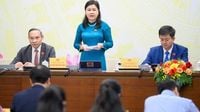On May 4, 2025, during a press conference led by Le Quang Tung, Secretary General of the National Assembly, significant discussions took place regarding the upcoming 9th session of the 15th National Assembly. Among the key topics were the proposal to shorten the term of the National Assembly and various administrative changes due to the merging of provinces.
Nguyen Phuong Thuy, Deputy Chairman of the Legal Committee of the National Assembly, addressed questions concerning the potential shortening of the National Assembly's current term. She emphasized that this proposal aims to meet practical requirements and has been a topic of discussion in previous terms. "The time from the end of the National Party Congress in January until the elections, usually held around May 19, is quite lengthy, creating several inadequacies in consolidating leadership positions at both central and local levels," Thuy stated.
In light of this, the Standing Committee of the National Assembly has considered and agreed to propose shortening the term of the 15th National Assembly by three months, thus aligning the next elections more closely with the National Party Congress. This adjustment is anticipated to facilitate a more efficient consolidation of Party and State personnel.
Thuy further elaborated that the Law on Election of National Assembly Deputies and People's Councils will undergo amendments aimed at simplifying the electoral process and reducing implementation time. This will ensure that elections can be conducted swiftly while still upholding citizens' voting rights.
Another critical aspect discussed was the mechanism for appointing high-ranking personnel in administrative units following the upcoming administrative restructuring. Thuy explained that the Politburo has issued a conclusion regarding the appointment of officials to positions in the People's Council and People's Committee after the merger of administrative units, rather than conducting elections as has been customary. This mechanism is deemed necessary due to the unique nature of the current administrative restructuring, which includes merging provinces and discontinuing district-level administrative units.
Thuy emphasized that this appointment mechanism will only be applied in 2025, after which the standard electoral process will resume. This approach is also reflected in proposed amendments to the 2013 Constitution, which will provide a legal basis for such appointments.
During the press conference, Thuy also highlighted the importance of gathering public opinions on the proposed amendments to the Constitution. She noted that the scope of the amendments will involve only eight out of the 120 articles of the Constitution, which has been widely discussed and supported by the public over the past months.
Furthermore, the National Assembly is set to establish a committee to draft these amendments, with public consultations expected to commence shortly after the opening session on May 6, 2025. This feedback period will last for approximately one month, during which citizens will have the opportunity to express their views on the proposed changes.
In addition to these constitutional amendments, the National Assembly will focus on addressing institutional bottlenecks that have hindered governance. Thuy pointed out that the upcoming session will consider a total of 34 draft laws and 11 resolutions containing legal regulations, aimed at resolving existing issues and streamlining administrative processes.
Thuy explained that the recent Resolution No. 66-NQ/TW, issued by the Politburo, sets ambitious goals for the National Assembly and the Government, including the removal of legal bottlenecks by 2025 and the establishment of a coherent legal framework for governance by 2027. The resolution outlines a roadmap for addressing overlapping and conflicting legal regulations that have complicated governance and economic activities.
As the National Assembly prepares for this significant session, Thuy urged all members to focus on the urgent need for reforms and to ensure that the legislative process remains responsive to the needs of the people. She concluded by expressing confidence that the upcoming session would lead to meaningful changes that enhance the efficiency and effectiveness of the Vietnamese political system.
In summary, the discussions at the press conference highlighted critical reforms aimed at improving the legislative framework and governance in Vietnam. With the prospect of shortening the National Assembly's term, appointing officials through a streamlined process, and amending the Constitution, the National Assembly is poised to take significant steps toward a more efficient and responsive government.




